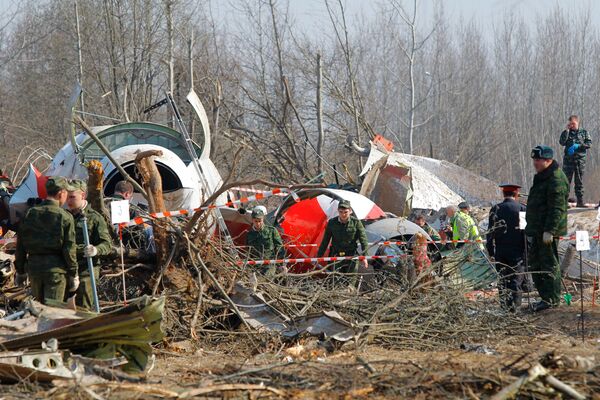Poland released its final report on Friday on the plane crash that killed Polish President Lech Kaczynski last year, suggesting that both the Polish flight crew and Russian air traffic controllers were at fault.
It also said "third persons" in the plane's cockpit before the crash had intefered with the pilots' work.
It added that the crew “was under some pressure due to the high profile nature of the flight.”
On April 10, 2010, the Polish president's Tu-154 plane crashed in heavy fog as it attempted to land at an airfield near the western Russian city of Smolensk. The presidential delegation was flying to Smolensk to mark the 70th anniversary of the 1940 Katyn massacre of thousands of Polish officers by Soviet secret police. Then Polish President Lech Kaczynski, his wife and a host of other top officials on board were killed.
The authors of the report were quick to stress however that they had not sought to "attribute blame" for the crash, but rather to establish the reasons for the disaster, in which 96 people died. The probe into the crash has been a source of tensions bewteen Russia and Poland.
The report said erroneous commands given by a Russian traffic controller and the inadequate training of Polish crew were also likely to have been among the causes of the crash. It highlighted the fact that the pilot was too late in aborting his first attempt to land.
The Polish commission also stated that the Russian controller responsible for the air traffic zone had little experience.
“This was only the second flight he had handled in a year and he gave the crew erroneous instructions,” commission experts said at a press conference in Warsaw on Friday.
The report also said that the aircraft’s Terrain Warning Approach System (TAWS), which should have warned the crew that they were in danger of impacting the ground, was not ready for the flight.
“The TAWS system was not properly configured for a flight to Smolensk. It should have been set up and activated by the co-pilot,” experts presenting the report in Warsaw said.
In addition, the Polish commission said the Russian air traffic controller at Smolensk gave the crew incorrect information about the aircraft’s position on the approach.
The report said the crew had ignored the TAWS warning, descending 60 meters below the critical level.
The Russia-based CIS Interstate Aviation Commission (MAK) said on June 8 the aircraft’s TAWS and flight computer were in good working order.
Analysis by a laboratory belonging to the UASC company in Redmond, USA, showed that the equipment “provided the crew and flight control system with the necessary information,” MAK said.
The Polish crew made the right decisions but lacked experience and training to carry them out in poor weather conditions, said Interior Minister Jerzy Miller, who headed the Polish commission.
“The pilots decided to go for a second approach,” Miller said. “They did not want to land in difficult conditions, they were not suicidal.”
Miller said it was up to the organizer of the flight, and not the pilot, to decide where to land.
The flight was organized by the presidential executive office. The Polish Air Force denied media reports last year that the crew had received “secret instructions” to go to a reserve aerodrome only with the president’s consent.
The Polish opposition criticized the report.
“This wasn’t a report, it was just Miller’s lies,” said MP Antoni Macierewicz of Law and Justice, an opposition party co-founded by the late President Kaczynski and his twin brother, Jaroslaw Kaczynski, who is now the party’s chairman.
Macierewicz said the report was “an attempt to confirm Russian propaganda,” adding that anyone reading it would think that Poland was alone responsible for the death of its president.
David Learmount, safety and operations editor for Flight International, and a former RAF flying instructor, said the Polish report was badly flawed.
“They knew the cause of the accident was the crew, but the politicians in Poland have long been saying Russia was to blame, so the only thing they could do was to put some of the blame on the Russian controllers," he said.
"The report admits that the crew was badly trained, but I’d say there was more to it than that. There was a fair amount of bad discipline on the flight too,” he said.
Polish investigators have conducted three test flights of another presidential Tu-154 airliner to scrutinize the last seconds of the flight, including whether the pilots had a chance to pull the plane up and if they could have gone around the landing site a second time.
The Russia-based Interstate Aviation Committee (MAK), along with leading flight safety experts, laid the blame for the crash on the Polish crew. Polish politicians denounced the report, saying it was one-sided or a cover-up.


